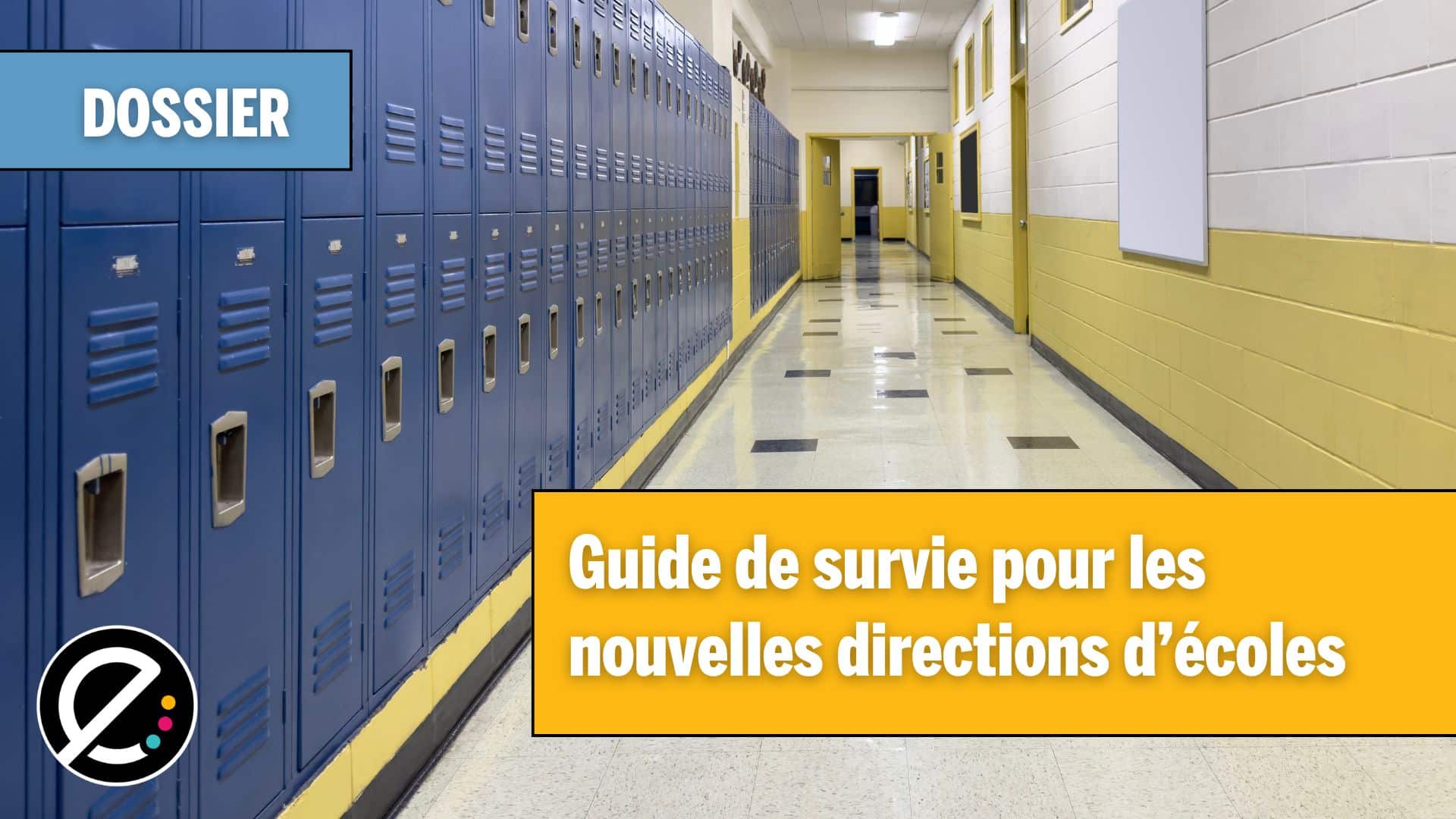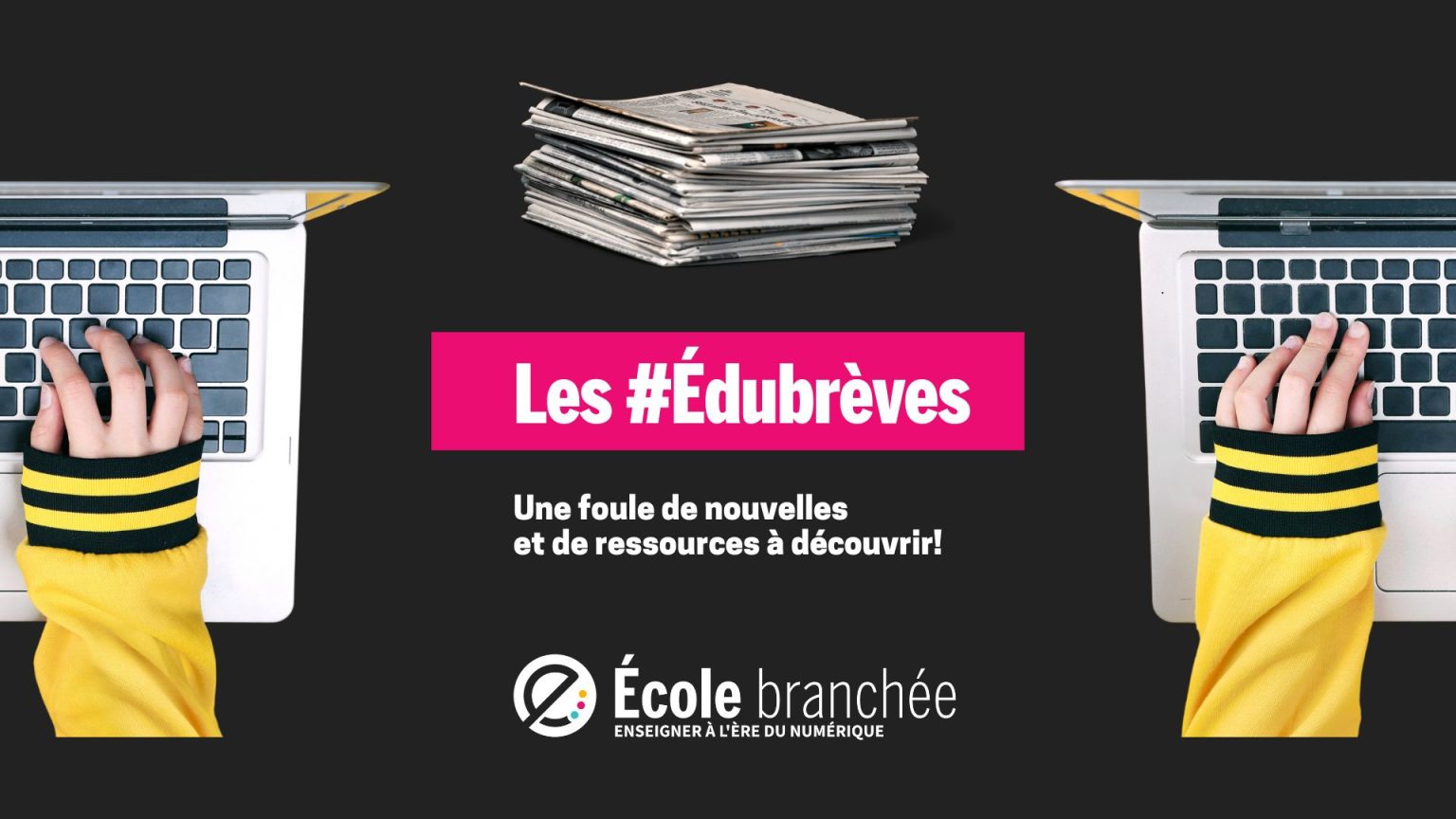
Bon mardi! Voici les #Édubrèves de la semaine. N’hésitez pas à les partager ou à m’écrire si vous avez des nouvelles à faire circuler.
Dans cette édition : le Collège Durocher Saint-Lambert inaugure l’Alinéa, des campagnes de sociofinancement en éducation, Festilou, le festival de contes pour la jeunesse, le concours « Nous aimons les enseignants », un outil de transfert sur la persévérance et la réussite éducative des élèves autochtones, un quiz pour la Semaine mondiale d’action pour l’éducation et bien plus!
Bonne lecture.
Attention, l’usage de GIF animés dans ce condensé de nouvelles brèves est à des fins de divertissement seulement!
Le Collège Durocher Saint-Lambert a inauguré l’Alinéa
Issu d’une vision pédagogique novatrice qui propose de créer des ponts entre les communautés et de faciliter le partage des ressources et d’expertise entre école, communauté, milieu des affaires et experts, le nouveau pavillon du Collège Durocher Saint-Lambert (CDSL) a été inauguré dans les dernières semaines. Le CDSL a créé cet environnement scolaire, baptisé l’Alinéa, pour qu’il s’articule autour de trois pôles d’expertise: le développement durable, le numérique au service du citoyen et la créativité et l’entrepreneuriat. On retrouve à l’Alinéa un lieu de rassemblement, des classes extérieures, de grandes terrasses, un espace de travail collaboratif pour chacun des pôles d’expertise, un espace café et une serre.
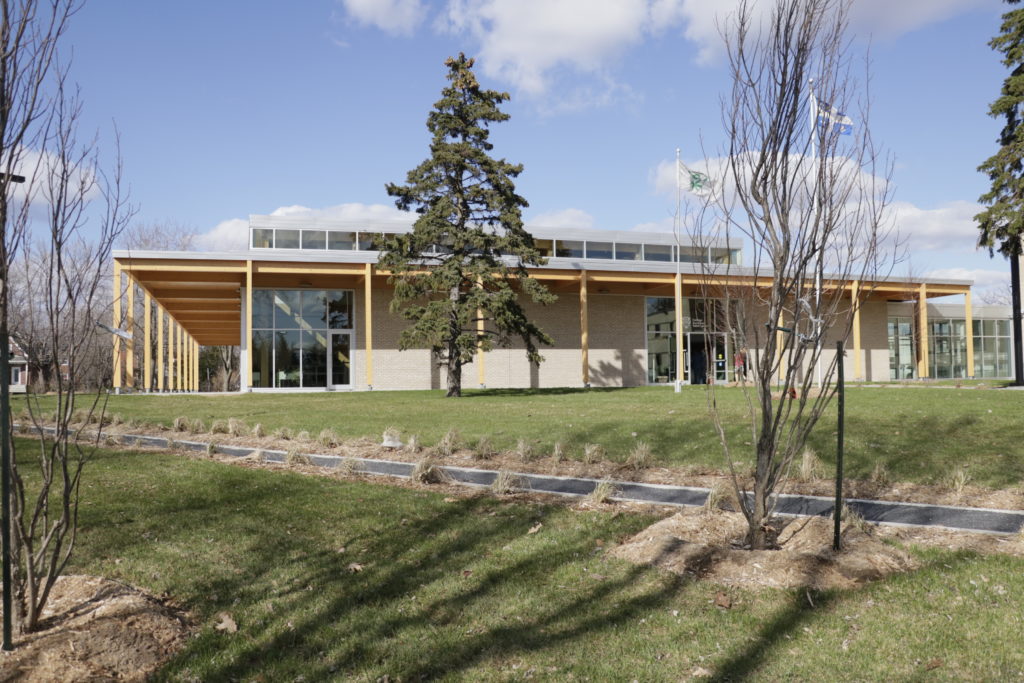
Le 20 mai 2022, une capsule temporelle sera scellée dans le pavillon. Le projet de capsule a vu le jour grâce à l’initiative d’une enseignante d’histoire de 4e secondaire, appuyée par l’enseignant ambassadeur du pôle de Créativité et entrepreneuriat au Collège. La capsule sera scellée jusqu’en 2060, année marquant le 150e anniversaire du Collège.

Deux campagnes de sociofinancement à souligner cette semaine
- Caravane Littéraire pour communautés vulnérables : L’enseignante de Québec, Catherine Lapointe, souhaite « faire vivre des expériences positives de lecture aux communautés vulnérables, démocratiser la lecture, provoquer des échanges dans des espaces ludiques, éphémères et réhabiliter une lecture plaisir ». Elle a déjà commencé à parcourir la ville de Québec avec son Westfalia l’été dernier et elle souhaite poursuivre l’expérience cette année.
- Le premier magazine jeunesse sur l’alimentation au Québec : Deux passionnées d’alimentation souhaite concrétiser le projet d’offrir un magazine sur le thème de l’alimentation aux jeunes québécois.
Des idées d’organisation de classe
Comment aménager votre classe si vous avez 15 tablettes électroniques pour 30 élèves? Cette infographie vous propose des options.
1️⃣5️⃣ tablettes pour 3️⃣0️⃣ élèves : quelles #scenarisations #pedagogiques ?
— SOPHIAE (@sophiaefrance) May 11, 2022
Des idées d'organisation dans cette #infographie de @JohannNallet de @acpoitiers ➡️ https://t.co/rEE5ZEIqSw #tablettes #numerique #edtech pic.twitter.com/369j4ez21U
Les gagnants du Défi Régime énergétique en classe 2022
Passer une heure sans électricité, calculer son empreinte carbone et apprendre à trouver des sources d’énergie fantômes ne sont que quelques-uns des 16 défis liés à l’énergie que les élèves de partout au Canada ont relevés au cours de la 11e édition du Défi Régime énergétique en classe.

Ce programme, présenté par Canadian Geographic Education et Shell Canada, a été créé pour inciter les élèves de la maternelle à la 12e année d’un bout à l’autre du pays à mieux conserver l’énergie. Entre février et fin avril, 531 classes de partout au pays ont relevé des 16 défis liés à la conservation de l’énergie. Ces épreuves ont permis aux élèves de passer 2 653 heures sans électricité, d’économiser 138 460 litres d’eau et d’empêcher 107 182 articles de se retrouver dans des sites d’enfouissement.
La liste complète des gagnants est disponible sur le site du Défi..
13e édition de Festilou, festival de contes pour la jeunesse
Présenté jusqu’au dimanche 29 mai, dans différentes salles de la région de Montréal, au Théâtre de l’Esquisse ainsi que dans les bibliothèques partenaires, Festilou est un festival de contes gratuit pour les jeunes. Près de 70 activités de contes sont au programme, avec une quarantaine d’artistes du Québec, de l’Ontario, de la Colombie-Britannique et de la France. Les éducateurs sont invités à participer avec des groupes d’élèves.
Précarité sociale et économique : quelles sont les villes ayant un indice de grande vulnérabilité?
Dans le cadre de la 4e édition de l’événement AlphaRéussite, la Fondation pour l’alphabétisation du Québec a dévoilé les résultats de l’étude « La littératie au Québec : un phénomène de grande vulnérabilité » réalisée par l’économiste Pierre Langlois, alors le Québec est animé par des enjeux de relance économique post-pandémique, d’inflation et de pénurie de main-d’œuvre.
L’étude met en lumière la coexistence d’enjeux de littératie et de revenus qui pourrait donner lieu à « une tempête sociale parfaite ». Dans une liste de 50 villes et cités régionales, l’indice de grande vulnérabilité de trois villes culmine à près de 10 %, soit Shawinigan (9,66 %), Lachute (11,96 %) et Joliette (13,36 %).
Devant ces résultats, l’économiste Pierre Langlois avance qu’une première étape pour lutter efficacement contre la grande vulnérabilité serait d’associer un programme de requalification des compétences de base à un programme visant un soutien financier minimal à hauteur de la mesure du panier de consommation (MPC) d’un ménage ou d’un individu sans contrainte à l’emploi.
Consultez tous les documents relatifs à l’étude.
Concours « Nous aimons les enseignants »
Bureau en Gros lance le concours « Nous aimons les enseignants » visant à reconnaître des enseignants inspirants. Les nominations peuvent être soumises jusqu’au 15 juin. Huit enseignants de partout au Canada seront sélectionnés pour avoir la chance de gagner une carte-cadeau Bureau en Gros de 1 000 $ à utiliser pour leur salle de classe ou pour mettre à niveau une technologie, ainsi que 250 $ en espèces pour prendre soin d’eux-mêmes.
Pour soumettre une candidature ou en savoir plus sur le concours Nous aimons les enseignants, visitez le bureauengros.com/nousaimonslesenseignants.

Un quiz pour la Semaine mondiale d’action pour l’éducation
En collaboration avec La Dictée P.G.L., le Programme CLÉ a développé un quiz permettant d’aborder le sujet de l’importance de l’éducation avec les jeunes de façon ludique. Certaines réponses recueillies dans le cadre de ce quiz serviront à construire une mosaïque de mots qui sera diffusée lors de la Grande finale internationale de La Dictée P.G.L. le 22 mai prochain. Nous faisons appel à vous pour diffuser ce quiz au sein de votre réseau avant le 20 mai pour que les réponses se retrouvent dans la mosaïque. À la maison ou en classe, participez en suivant ce lien.
10e édition du colloque plein air Apprendre à ciel ouvert
La 10e édition du colloque plein air Apprendre à ciel ouvert a réuni 250 personnes les 6 et 7 mai dernier à l’école secondaire Mont-Saint-Sacrement (Saint-Gabriel-de-Valcartier). Les participants se rejoignaient sur une vision commune : celle d’amener les jeunes à être actifs, à apprendre, à socialiser et à se dépasser à l’extérieur, en favorisant un plus grand contact avec la nature et la communauté.
Les participants ont eu le plaisir de découvrir une variété d’activités et de sports de plein air, en passant par le canot, la voile, le ski sur terrain sec, la cuisine en plein air, la fabrication d’abris, l’orientation en forêt, le cyclo-camping, le Landart, etc. L’événement leur a également permis d’assister à une série d’ateliers sur des thèmes variés tels que l’éducation en nature chez les enfants des Premières Nations, les enjeux de conservation de l’éducation en plein air, l’enseignement de la littératie et de la numératie, l’utilisation d’outils avec les jeunes, le jeu libre extérieur, la biodiversité pour enseigner ou encore la gestion de groupe à l’extérieur.
Consultez le communiqué de presse complet.
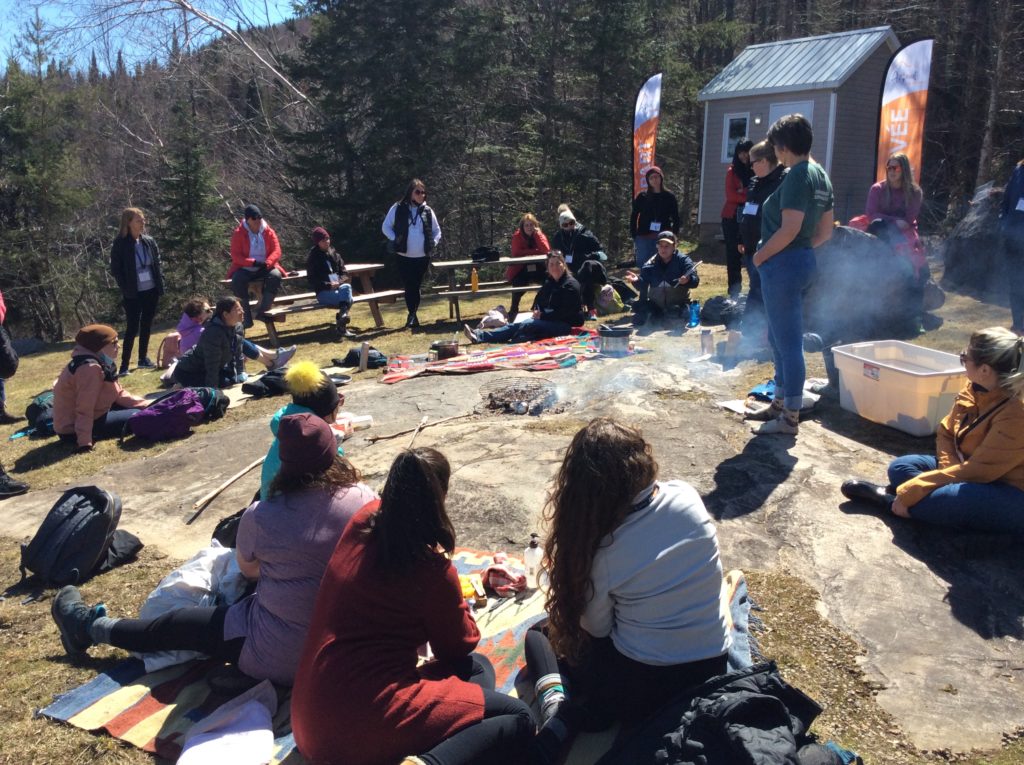
Un nouvel outil de transfert sur la persévérance et la réussite éducative des élèves autochtones
Saviez-vous que le nombre d’élèves autochtones est en hausse depuis les dix dernières années? Comment le personnel scolaire peut-il adapter ses pratiques pour favoriser leur persévérance et leur réussite éducative? Grâce à la collaboration entre le ministère de l’Éducation (MEQ) et le Centre de transfert en réussite éducative du Québec (CTREQ), une infographie a été produite pour guider le personnel scolaire dans ses pratiques.
L’outil de transfert met en lumière des exemples de pratiques porteuses qui laissent une plus grande place aux perspectives autochtones. En voici quelques exemples :
- Valoriser les langues autochtones dans toutes les matières scolaires;
- Mettre en place des conditions pour un meilleur recrutement et pour la rétention de personnel scolaire autochtone et allochtone;
- Faire participer les aînés aux activités scolaires, car ils possèdent des savoirs sur les langues et les cultures autochtones et en sont les gardiens.
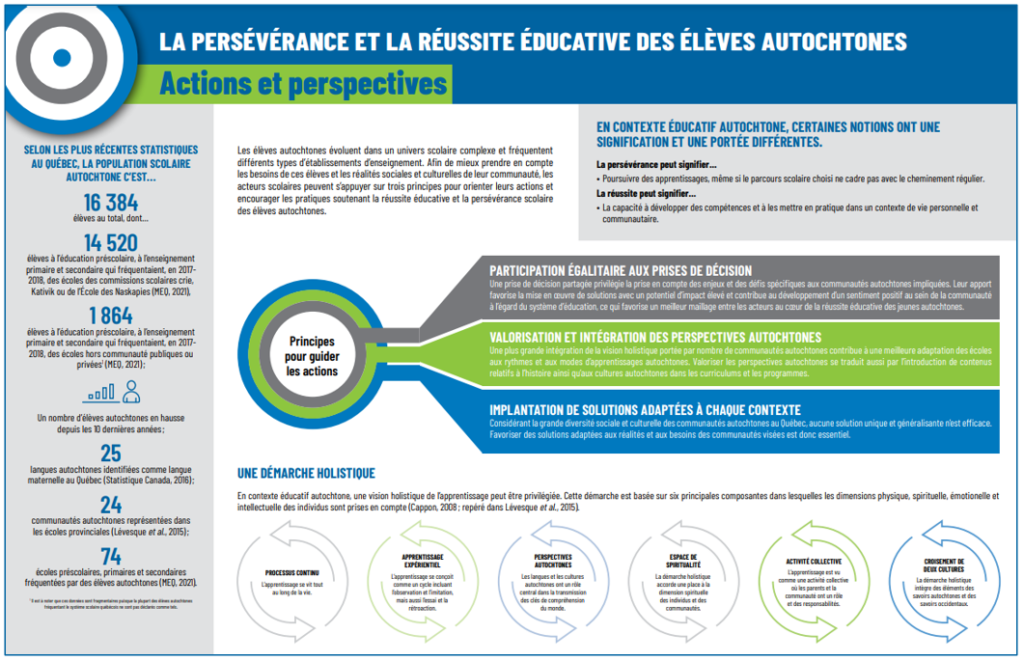
L’éducation fait jaser (encore!)
- Enseignement virtuel : la technologie ne doit pas prendre le dessus sur les apprentissages : Dans ce texte publié sur La Conversation, un groupe de chercheurs en enseignement en milieu scolaire affirme que les méthodes efficaces en mode présentiel doivent être transposées en mode virtuel. Les auteurs déplorent que « trop souvent, le temps d’enseignement [en ligne] est passé à faire de la logistique, ce qui représente une perte de temps d’enseignement ».
- Pour un institut national d’excellence en éducation au Québec : Dans ce texte, Frédéric Tremblay, médecin et candidat au doctorat en éducation à l’UQAM, rêve du jour où le Québec aura un Institut national d’excellence en éducation au même titre qu’il a déjà un Institut national d’excellence en santé publique. Ce jour-là, écrit-il, « les données probantes en éducation circuleront avec la même fluidité que celles sur les antibiotiques ».
- L’école réinventée : Dans ce texte, Christèle Piché, enseignante en éducation physique et à la santé, invite les milieux scolaires à miser sur le développement des compétences sociales et émotionnelles chez leurs élèves. « Je crois donc fermement que d’enseigner aux élèves la gestion d’émotions, la communication non violente ainsi que la gestion du stress rendra nos petits amours responsables de leur bien-être et seront ainsi plus réceptifs aux apprentissages pédagogiques ».
Découvrez Créativité Québec
La mission de Créativité Québec est d’outiller le Québec avec les compétences essentielles pour réussir au 21e siècle. Pour y parvenir, ils offrent des formations en ligne ainsi que des ateliers hybrides. De plus, ils organisent des compétitions d’innovation permettant à notre communauté de mettre en pratique les apprentissages acquis et de passer à l’action.
Les 3 principes de Créativité Québec :
- L’être humain apprend de manière organique, par la pratique et par le jeu.
- La créativité en action doit être le levier pour affronter les plus grands enjeux de la société.
- L’inspiration est un droit pour tous, à commencer par les jeunes.
En terminant, un croquis-note sur la vidéo en classe.
Quel bel atelier dynamique de la part de @TQcenclasse ! J'ai adoré l'énergie et la multitude de possibilités proposées! #devprof @ecolebranchee pic.twitter.com/PtIqQBgvIq
— Laurie Couture (@Lauriecouture92) May 6, 2022
Si vous en voulez encore plus, vous pouvez (re)voir les #Édubrèves de la semaine dernière.
On se retrouve bientôt! N’hésitez pas d’ici là à nous « tagguer » (en bon français…) sur Twitter (@millaudrey ou @riomarti) pour que nous parlions de votre projet/ressource dans une prochaine revue de la semaine! Passez une excellente semaine.





